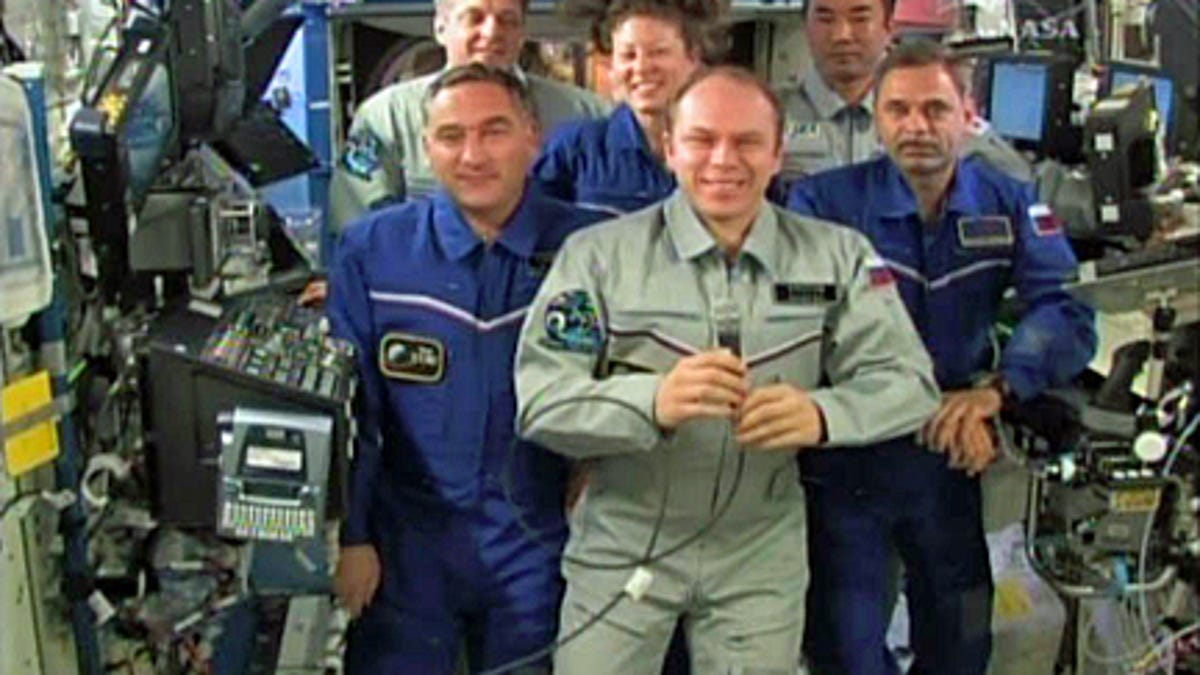Russian president calls station, suggests 'space summit'
Russian President Dmitry Medvedev calls space station to mark 49th anniversary of Yuri Gagarin's launch on first manned space flight.

JOHNSON SPACE CENTER, Houston--Russian President Dmitry Medvedev called the International Space Station Monday to mark the 49th anniversary of Yuri Gagarin's launch on the first manned space flight, suggesting an international space summit to discuss future cooperative ventures on the high frontier.
"Space is our highest priority, regardless of how hard the economic situation is in the country," Medvedev said in translated remarks. "Space will always remain our priority. This is not just somebody's interpretation, it's our official state position."
"We want to thank you again for today's holiday," station commander Oleg Kotov replied.
All six Expedition 23 crew members--Kotov, Alexander Skvortsov, Mikhail Kornienko, Tracy Caldwell Dyson, Timothy Creamer, and Soichi Noguchi--gathered for the conversation in the U.S. Destiny laboratory module.
Their shuttle crewmates--Discovery commander Alan Poindexter, pilot James Dutton, flight engineer Dorothy Metcalf-Lindenburger, Stephanie Wilson, Japanese astronaut Naoko Yamazaki, and spacewalkers Richard Mastracchio and Clayton Anderson--spent the day moving equipment and supplies into the station and preparing for a third and final spacewalk Tuesday.
Discovery carried up more than 17,000 pounds of cargo inside an Italian-built module that was attached to the station last week. Mastraccio and Anderson staged two spacewalks Friday and Sunday to install a 1,700-pound tank of ammonia coolant on the lab's main power truss.
During the final spacewalk Tuesday, a depleted ammonia tank will be moved to Discovery for return to Earth.
Because of an antenna problem on the shuttle, Discovery's mission was extended one day to permit the crew to carry out a final heat shield inspection while docked to the station, using the lab's communications system to downlink the data.
Landing back at the Kennedy Space Center is now targeted for 8:53 a.m. EDT on April 19.
Medvedev told the space station crew that in the early years of the space program, "development of cosmonautics was based on ideology and now, this is the area where we should try to assist each other in creating the mechanisms that will yield collective results. And this cooperation, I believe, is extremely important for the future, taking into account that space programs become more and more complicated, more and more costly, and the goals that we set become more and more complicated.
"No country can develop space alone, we need to combine our efforts and we need to talk about it more often," he said. "So maybe we could have some sort of international meeting, maybe at the heads of governments level. Because we talk about various issues, such as tackling all kinds of challenges, dangers, and hazards that humanity is facing these days, various disarmament programs, etc., but (space) is a very important and positive factor that unites us all.
"So maybe it would be good to have a summit, maybe at the heads of governments level, for the countries that are working in space. So see, I have a very good idea on this holiday. What do you think? We could invite you to participate as well."
Kotov called the International Space Station "a great example of international cooperation where we have two completely different technical schools, Russian and U.S., and we combine our effort, we found the interfaces not only for machines but also for humans and we've created this wonderful, fully functional station...and that is something that should be used in the future."
"Together, we have created a single organism," Kotov said. "The crew functions as one body even though it consists of representatives from different countries. We have had a European astronaut on board, we have Japanese astronauts on board right now, we have American astronauts, Russian, and we understand each other perfectly, we don't have any conflicts and I hope this will be true also regarding our cooperation everywhere else."
"Oleg, those are very good words, it's nice to hear that," Medvedev replied. Then he changed the subject, saying "I think it will be a mistake if I don't ask you some simple questions. How's life?"
"Well, it's like one of the most popular questions that we're asked--what do you like best in space?" Kotov said. "And my answer is always two things: weightlessness and the view out of the window. Also, just life in this three-dimensional space, where walls and floor and ceiling become all the same. That's very interesting, and it takes changing your mind the way you think about your surroundings."

